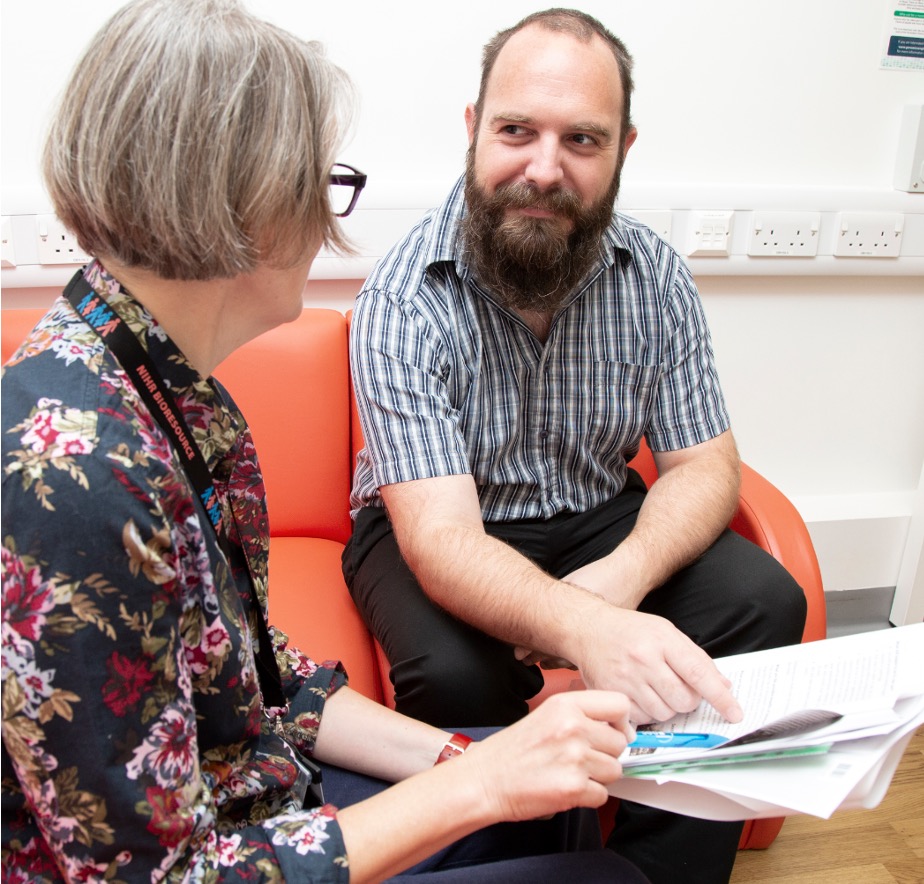Our research: case studies

Diagnosing autism in adulthood
Autism affects 1% of the child and adult population, costing the UK approximately £28 billion each year. Diagnosing people with autism requires a specialist assessment and waiting lists for these clinics are sometimes months or even years.
Many patients are overlooked or misdiagnosed, seeing a variety of clinical specialists before they receive a diagnosis.
The Cambridge team were keen to improve the referral and so developed a new screening tool called the Autism Spectrum Quotient (AQ) for front-line clinicians and social care professionals.
The AQ is a questionnaire designed by the researchers to evaluate how many autistic traits a person has. If a patient’s scores are high, the tool alerts clinical staff to make a referral for a full assessment. It was first developed in 2001 and was one of the first metrics of the autism spectrum. The full questionnaire has 50 items but the Cambridge team produced a brief version of just 10 items, known as the AQ-10.
This new diagnosis tool provides a quick but reliable indicator that someone may potentially have undiagnosed autism, therefore ensuring their referral for a diagnosis is both more accurate and quantitative, not just based on opinion. Ensuring that the right patients are referred to the specialist clinics means a better use of clinic time and a quicker journey from the referrer to the final assessment.
Once diagnosed, the patient can then be helped to access the support and therapies they require. The AQ has been used widely in research studies, and in 2013 NICE guidelines it was recommended for use with adults with suspected autism or Asperger Syndrome. The tool is now used widely both nationally and internationally.

New app to help people with OCD symptoms
A new app developed by Cambridge researchers may help people with obsessive compulsive disorder (OCD) manage their symptoms better.
One common behaviour of people with OCD symptoms is repeated hand washing, to prevent a feeling of contamination. Excessive washing can be harmful, however, causing problems such as skin damage as well as reducing people’s mental health and wellbeing. Furthermore, severe contamination fears may prevent people from leaving their own homes.
Compulsive behaviours are related to ‘cognitive rigidity’ – finding it difficult to adapt to new situations or rules and consider alternative behaviours or responses. Current treatments are not effective for all sufferers, with up to 40% of patients not experiencing significant benefit from the most common options.
Cambridge researchers have developed a new treatment to help with excessive hand washing through an app. A study to test the new app used otherwise healthy patients who had expressed strong fears of contamination on the Padua Inventory Contamination Fear Subscale, which is a questionnaire commonly used by researchers to measure concerns associated with contamination.
Participants who used the app to watch videos of washing their hands or touching contaminated surfaces had reduced feelings of contamination and improved cognitive flexibility.
Further research is needed and researchers hope the technology will help people manage their symptoms and experience better quality of life and wellbeing.

Testing whether an anti-inflammatory drug can help people with depression
Following research evidence that some patients with depression have increased levels of inflammation, researchers want to see if an anti-inflammatory medicine has the potential to treat patients suffering from depression who have not responded to their current medications.
In a nationwide study led from Cambridge, researchers will be testing a new anti-inflammatory drug, specifically designed to reduce levels of inflammation in the brain. Patients with depression will be asked to take the new drug or a placebo (a pill that is inactive) in addition to their regular anti-depressant medication for 8 weeks.
Researchers will then measure whether the new anti-inflammatory drug reduces depressive symptoms by asking participants to complete questionnaires. They will also collect blood and saliva samples, and take images of the brain using MRI, to understand more precisely how the drug works on the immune system and the brain.
This study is currently running in Cambridge and will shortly also be open for recruitment in London, Oxford, Cardiff and Glasgow. It is due to finish in 2022.

Stress does not lead to loss of self-control in eating disorders
People who experience eating do no lose self-control – leading to binge-eating – in response to stress, research has found.
Cambridge researchers investigated whether binge-eating is caused by stress. They invited women with anorexia nervosa, bulimia nervosa and healthy controls to attend a study.
In a monitored environment women would receive controlled meals provided by a metabolic nutritionist. The women then underwent a fasting period during which they performed tasks whilst they received an MRI scan so researchers could look at their brain activity. The women also performed tasks to increase their stress levels, which was repeated.
After the tasks were completed the women were then offered an ‘all you can eat’ buffet in a relaxing environment and were told they could eat as much or as little as they would like.
On the second day of their study, the volunteers carried out the same tasks, but without the added stress.
The team found that even when the participants were not stressed, the women with bulimia nervosa performed worse on the main task, but this was not the case for those women affected by anorexia nervosa.
The researchers also found stress did not affect the actual performance in any way for either of the patient groups or the controls. However, the patient groups showed some differences in brain activity when they were stressed – and this activity differed between women with anorexia and those with bulimia.
While the researchers observed that the patients in general ate less in the buffet than the controls, the amount that they ate did not differ between the stress and control days.
The researchers also found when they were stressed, people with anorexia nervosa produce more of the hunger hormone, but contradictorily also more of a hormone that should tell them that they are full, so their bodies are sending them confusing signals about what to do around food.
People with bulimia nervosa had lower levels of cortisol, the ‘stress hormone’, than in healthy volunteers.

